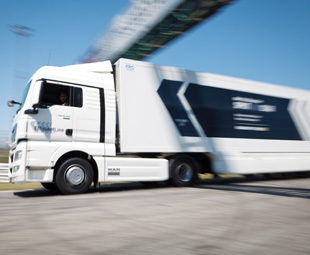Fleet management hits cyberspace!

The power of the internet has been harnessed for use by fleet owners, who will now be able to check up on their vehicles and extract information they require at any time.
The internet is a truly wondrous invention which has changed the way we live. We use it to book flights; buy groceries; research absolutely everything; stay in touch with friends, family and business associates … it has infiltrated every aspect of our lives, both on a personal and professional level.
It is also impacting on the field of fleet management. Gone are the days when it was difficult to keep an eye on your fleet – today the internet is, quite literally, your eye in the sky.
Now Standard Bank Fleet Management has embraced this technology with a new product offering called FleetSaver, which was introduced after a survey revealed that customers with less than 25 vehicles in their fleet were looking for a business tool to keep track of their fleet developments, but with minimal interruption to their working day.
“We found that, where fleets were smaller than 25 vehicles, the management function typically fell to the owner or manager of a business, as these companies generally do not have a dedicated fleet manager,” explains David Molapo, managing director of Standard Bank Fleet Management.
“FleetSaver was born from the needs outlined in the survey. However, it has also been welcomed by fleet managers of larger companies who wish to get a working snapshot of their fleet costs on a daily, weekly, or monthly basis,” he says.
Making fleet data accessible 24/7 via the internet has been made possible through a dedicated website. Once a fleet owner has registered for the service, they can decide on the frequency of reports required in a PDF format. An e-mail will be delivered in the customer’s inbox at the required time, prompting a visit to the password protected FleetSaver site.
“On the home page, a dashboard will open where the user will be offered access to a fleet overview, information, exceptions, odometer corrections and communication. This high level data can then be segmented and ‘drilled into’ by taking the customer directly into FleetSaver, where they will able to view more detail,” says Molapo.
In the overview section, customers are given a summary of fleet costs over a number of categories via interactive pie-charts that change on a daily basis as new information is included. These “month-to-date” and “year-to-date” charts display totals for various categories that include:
• Total fuel cost, which sets out the total fuel expenses for an entire fleet. By selecting the total, a breakdown of total fuel expenses for each vehicle with its relevant cost centre can be selected. Any vehicle’s particulars can then be opened so vouchers for the specific vehicle can be viewed;
• Total repair and maintenance cost for the fleet. As with the total fuel cost category, information on each vehicle can be obtained;
• Total toll costs. Information on total costs can be broken down and information obtained on specific vehicles;
• Total miscellaneous costs can be treated in the same fashion as other categories.
The information section consists of pre-defined queries displaying important fleet information that can be drilled into. These cover running costs such as total litres consumed, petrol versus diesel costs, total kilometres travelled, and litres consumed compared to the national average for a particular vehicle.
One of the most powerful features is the estimated loss or gain tool, which will compare the actual consumption of a vehicle, based on its litres per 100 kilometres, against the national average (for similar vehicles) and then calculate the estimated loss or gain in rand value. This gives fleet managers an indication of the fuel expenditure efficiency of their fleet.
Value is added through a customer being able to compare a pre-selected “actual litres used” variance against the “customer-allowed variance” (either in litres or as a percentage) fuel consumption for a particular vehicle. If the variance set by the customer is exceeded, the query will display the difference between the vehicle’s actual litres per 100 kilometres and the variance selected.
 “We are also able to offer a query which will identify vehicles that had no movement or expenses recorded for a month-to-date. This will enable a customer to optimise fleet usage and reduce costs. Exceptions, mentioned on the overview page, can be viewed on the ‘exceptions tab’ and will notify fleet owners of aberrations that include same day fill-ups, drivers exceeding the tank capacity of vehicles, cost centres where lost, spoiled or disposed cards are being used, and odometer corrections,” Molapo tells FOCUS.
“We are also able to offer a query which will identify vehicles that had no movement or expenses recorded for a month-to-date. This will enable a customer to optimise fleet usage and reduce costs. Exceptions, mentioned on the overview page, can be viewed on the ‘exceptions tab’ and will notify fleet owners of aberrations that include same day fill-ups, drivers exceeding the tank capacity of vehicles, cost centres where lost, spoiled or disposed cards are being used, and odometer corrections,” Molapo tells FOCUS.
“Where a customer would like to add other exceptions, the facility to create and define them is also available on this web-based option. For more enhanced viewing, like operational details regarding fuel brands used and predictive modelling, customers can subscribe to the Fleet Information Management System (FIMS).
“The FleetSaver product was developed and introduced to the market just nine months after the need was identified. We are offering customers opportunities to obtain the information they need, whenever they need it,” Molapo concludes.
E-tolling provides new impetus for fleet management
With the imminent arrival of the e-tolling system in Gauteng, the importance of having an advanced fleet management system cannot be underestimated.
That’s according to Hein Jordt, MD of Ctrack Fleet Management. “While e-tolling has drawn its share of criticisms and complaints by business and consumers alike, the reality is that companies should prepare themselves for when the system comes into effect,” he notes.
“And it is not only the transport and logistics industries that will feel the impact of e-tolling, but also fast-moving consumer goods organisations. This will see consumers inevitably feeling the pinch in their pockets once retail prices across food, clothing, and other goods start increasing.”
It is in this changing and challenging environment that companies need to have systems in place that let them better manage their fleets by utilising more efficient routes and better monitoring driver behaviour.
“To this end, the Ctrack FleetConnect fleet management solution provides users with a system that integrates all components of fleet management into a centralised database,” says Jordt.
Financial directors, chief technology officers, and even human resource specialists are finding the data collected by FleetConnect invaluable in assisting them to work more closely with fleet managers in streamlining their operational efficiencies. “This enables users to understand their fleet better by highlighting opportunities to manage risk more efficiently and assess how one can identify and streamline fleet operations,” he explains.
Jordt notes that effective fleet management depends on accurate and relevant information. “The Ctrack Fleet Management System delivers more business information through executive dashboards and an improved reporting environment. FleetConnect helps fleet owners manage everything from toll fees, fuel usage, licence renewals and traffic offences, to vehicle service schedules, drive profiles – and any other aspect of their fleet,” he points out.
“By empowering decision-makers across industry sectors with the right kind of information in real-time, they are able to adjust to a rapidly changing environment.”
Tracker acquired in R3,9bn deal
A R3,9 billion buy-out has resulted in a change of ownership structure at Tracker, South Africa’s largest vehicle tracking company, and the entry of pan-emerging markets investor, Actis.
The transaction sees Remgro dispose of its interest in Tracker to Actis, while FirstRand restructures its investment to include RMB. The Mineworkers Investment Company (MIC) will increase its stake in the business, thereby improving the BEE credentials of the business.
“Everything we do at Tracker is underpinned by the principle that our work can make a real difference to quality of life in South Africa,” comments Tracker CEO, Alan Hutcheson. “Whether it is helping to track and recover assets, combating crime or delivering services that enable people and organisations to be more efficient, the creation of value is critical to our work. Today’s announcement reflects the confidence this consortium has in both our approach and our track record.”
Tracker is known for its vehicle recovery successes – it has achieved approximately
55 000 vehicle recoveries and over 10 000 criminal arrests since its establishment in 1996, more than any other tracking company in South Africa. It is utilised by the South African Police Service and has increasingly diversified into new technologies; the “track and Tracker” element is now being strongly complemented by the provision and application of intelligent data.
MTN goes mobile!
MTN Business has unveiled its Mobile Application Solutions – an integration of multiple tools for real-time data collection, collaboration and task completion. It is aimed at companies and organisations involved in data collection and surveying, in-field sales and transport and logistics.
The Mobile Application Solutions will use the MTN Business network and the latest smart phones to keep businesses, employees, inventory and fleets connected at all times. Nomalanga Nkosi, general manager for business marketing at MTN Business, comments on this new development: “The solution is designed to transform mobile workers in any industry from being informed to being empowered – by giving them access to the right information, at the right time, regardless of their location.”
With a smart phone and MTN’s Business customised application, mobile workers can, among other tasks: scan barcodes; access real-time stock inventories; and capture signatures. This enables them to complete the job on the spot.
Back at the office, managers can assign tasks, access sales charts, adjust staff scheduling, place orders and ultimately increase productivity and the bottom line.
“We are constantly searching for ways to simplify, streamline and add value to our client’s business and our new Mobile Application Solutions enable us to continue to do just that,” continues Nkosi.
Mobile Forms is a specialised application developed specifically for the mobile worker with the aim of simplifying their business life. This tool is particularly suited to mobile field researchers, as it supports the delivery of accurate information via an employee’s chosen cell phone.
This will enable them to convey information and data collected “in the field” back to the source in a timely and straightforward manner. The form’s application allows instant access to a range of templates while an employee is “on the move” and is built with intelligent validation software, meaning the form actually guides the field workers as to the sections that are compulsory to complete, as well as to what information is required for improved workflow integration.
In addition, it provides a simple set-up that also incorporates rich data sources (including GPS and photography in data capturing, without needing to switch applications), all while having the ability to work online and offline. This allows mobile workers far more flexibility, as they are not dependent on cellular tower coverage.
“We are constantly searching for ways to simplify, streamline and add value to our clients’ businesses and these additional Mobile Application Solutions not only do this, but allow this healthy balance to materialise. The industry can look forward to many more solutions that drive mobility and its positive economic impact going forward,” concludes Tebogo Mogapi, chief business sales and services officer at MTN South Africa.
CNG gas – a cost optimisation option for the fleet
Fleet owners these days face escalating financial challenges running their business, which made their exclusion from current carbon taxation all the more welcome. However this relief may be short lived, which could translate into fleet owners facing a growing financial load.
Carbon tax is calculated according to the carbon dioxide (CO2) emissions which vehicles dispense into the atmosphere. Commercial vehicles, with their massive CO2 discharges, will be subject to huge price hikes if they are subject to CO2 taxation. A solution would be the introduction of greener engines, but they cannot run on the high-sulphur fuel currently available in South Africa.
A possible solution to this pending problem could be compressed natural gas (CNG). This, a much cleaner energy source than coal by-products, offers a 35% reduction in CO2 emissions. Stanley Anderson, marketing director of Hyundai South Africa, states that CNG is a safe, clean and reliable energy source with high-energy capabilities. The gas is also available at a stable price. Vehicles which are converted to use this energy source will be able to run on CNG or traditional fuel. In fact, fleet owners will be able to choose their energy source at the flip of a switch.
Government, the CNG Group, and their partner Galileo have been laying the necessary infrastructure to support the rollout of CNG in South Africa’s near future. The country’s first station, with a capacity of
1,5 million gigajoules, has been constructed in Langlaagte, Johannesburg. Future plans include expanding this infrastructure as far as Durban and Cape Town.
Many vehicle manufacturers and importers alike, including Hyundai South Africa, have begun research into the costing, logistical details and viability of managing the conversion on certain vehicles. While the infrastructure is currently not for the mass consumer market, CNG presents a viable alternative energy source (for the fleet market), which certainly warrants consideration.
Published by
Focus on Transport
focusmagsa



